10 Best Contact Management Software for 2026
TL;DR
- We tested 20+ contact management tools; these 10 are the best.
- Great contact software saves time, syncs communication, and keeps relationships warm.
- Picks for solopreneurs, growing teams, and those juggling hundreds of connections.
- Includes both CRMs and true contact managers.
Every relationship starts with a name and then a follow-up, a reminder, a meeting, and maybe a sale. But the more contacts you juggle, the easier it is to let something (or someone) slip through the cracks.
Contact management software gives you one clean place to track who’s who, what you talked about, and what needs to happen next. With smart views, automatic logging, and calendar/email sync, these tools take the mental load off your plate.
We tested over 20 popular platforms, from full-featured CRMs to minimalist contact tools. After weeks of hands-on testing, creating contacts, syncing inboxes, tagging segments, and tracking conversations, these 10 rose to the top.
The best contact management software for 2026
- HubSpot CRM for all-in-one contact & sales tracking
- Airtable for spreadsheet lovers
- Bigin by Zoho CRM for small teams
- Freshsales for contact scoring and sales automation
- monday CRM for visual workflows
- Contacts+ for contact syncing across multiple accounts
- Copper for Google Workspace users
- Nimble for users pulling contacts from email + social
- Pipedrive for sales teams
- Less Annoying CRM for ease of use & simple setup
What’s the difference between a CRM and contact management software?
Both tools store contact information, but they serve different purposes.
Contact management software helps you manage people, without sales pipelines, automations, or reporting. It can:
- Store names, emails, phone numbers, and notes
- Keep your address book organized
- See a basic history of communication
CRM (Customer Relationship Management) software goes further. It helps you:
- Track leads and deals across a sales pipeline
- Automate follow-ups and tasks
- View team activity and performance
Use a contact manager if you just want to keep your contacts organized. Use a CRM if you’re managing relationships and a sales process.
What to look for in a contact management software?
When choosing contact management software, it’s important to focus on features that enhance efficiency, personalization, and ease of use. Here’s a breakdown of the most crucial features to look for.
How we evaluate and test contact management apps
We signed up for every tool. We created real workflows. We imported messy contact lists, synced emails, tested automations, and logged activity, just like you would.
Here’s what we focused on:
- Ease of use – Can you get going in under 30 minutes?
- Contact organization – Tags, filters, segmentation, and smart views that make sense
- Activity tracking – Emails, calls, meetings, and notes—logged automatically where possible
- Integrations – Gmail, Outlook, calendars, and external apps
- Data ownership – Easy export and clarity on data ownership
We spend hours testing every tool we write about to ensure our readers get the most accurate, up-to-date information.
Best Contact Management System Comparison Chart
Product | Best for | Pricing* | Site |
HubSpot CRM | All-in-one contact tracking | $15/user/month | |
Airtable | Spreadsheet lovers | $20/user/month | |
Bigin by Zoho CRM | Small teams | $7/user/month | |
Freshsales | Sales automation | $9/user/month | |
Monday CRM | Visual workflows | $12/user/month | |
Contacts+ | Multi-account contact sync | $9.99/user/month | |
Copper | Google Workspace users | $9/user/month | |
Nimble | Social & email contact capture | $24.90/user/month | |
Pipedrive | Sales teams | $14/user/month | |
Less Annoying CRM | Ease of use | $15/user/month |
*Pricing starts from
Best contact management software for all-in-one contact & sales tracking
HubSpot CRM
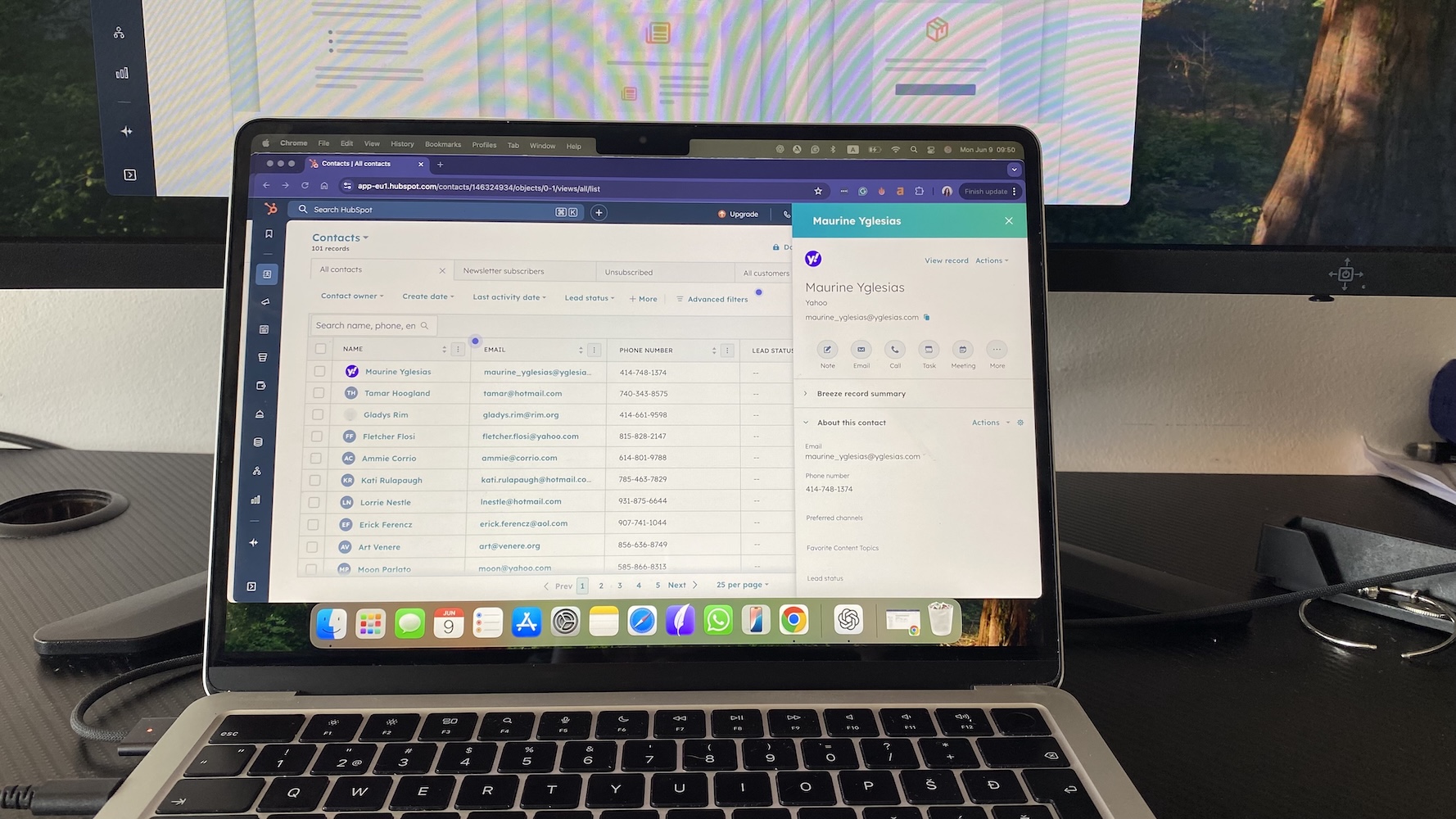
Pros
- Includes marketing and service tools
- Excellent Gmail and Outlook integration
- Free plan is surprisingly full-featured
- Great UI and mobile app
Cons
- Can feel bloated for simple contact use
- Paid tiers can get pricey
HubSpot CRM wraps contact tracking into your full sales workflow. It pulled in my Gmail history in minutes, automatically logging emails and meetings without setup headaches. Custom views, filters, and deal stages made it easy to segment leads from long-time clients.
Even on the free plan, I could track tasks, assign follow-ups, and see deal progress in dashboards. The interface feels polished but approachable, and I never had to dig to find contact history.
HubSpot starts as a contact manager, but grows into a full-blown CRM if you need it. That flexibility is a big plus if you’re scaling.
Pricing
Free forever plan available with limited features and 2 users. Starter plans from $15/user/month.
Helpful next steps
- Read our HubSpot CRM review
- Try HubSpot CRM for free
Visit site
Go to HubSpot CRM’s official website
Best contact management software for spreadsheet lovers
Airtable
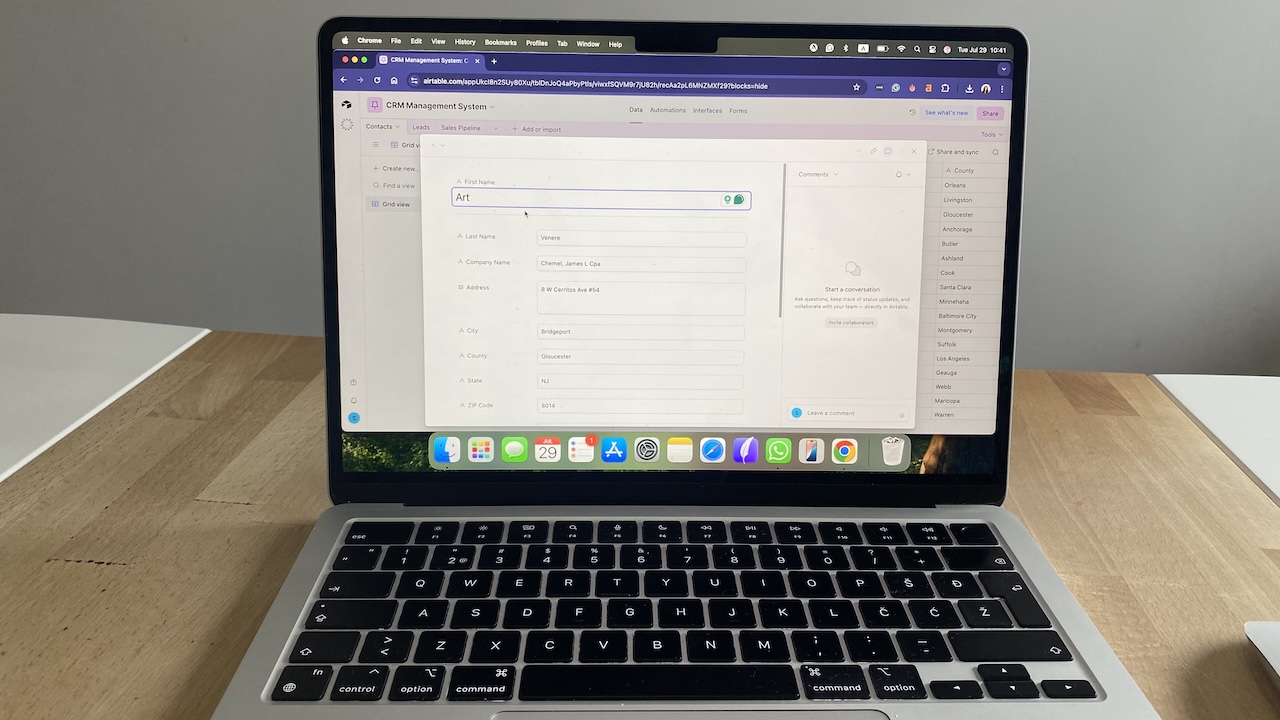
Pros
- Flexible, visual layouts (grid, kanban, calendar)
- Easy to customize without coding
- Tons of templates, including CRM-style bases
- Great for solo users or small teams
Cons
- No built-in email or call tracking
- Takes time to set up workflows from scratch
Airtable isn’t technically a contact management software, but if you like spreadsheets and want full control over how your contacts are organized, it’s one of the most customizable options out there.
I set up a contacts base using a template and had a functioning contact tracker in about 20 minutes. Airtable gently guides you with onboarding tips and examples, but it does expect you to tinker.
The flexibility is the real draw: I could sort contacts by tags, filter by deal stage, or switch to a kanban board to visualize follow-ups. But Airtable doesn’t track email or call history automatically. There’s no out-of-the-box activity logging, so you’ll need Zapier or other integrations for that.
Gmail and calendar integrations are available through extensions and third-party tools, but they’re not built in. On the plus side, Airtable makes it easy to export data, share views, and stay in control of your contact info.
Pricing
Free forever plan available up to 5 creators & 1,000 records. Paid plans start at $20/user/month.
Helpful next steps
- Read our Airtable review
- Try Airtable for free
Visit site
Go to Airtable's official website
Best contact management software for small teams
Bigin by Zoho CRM
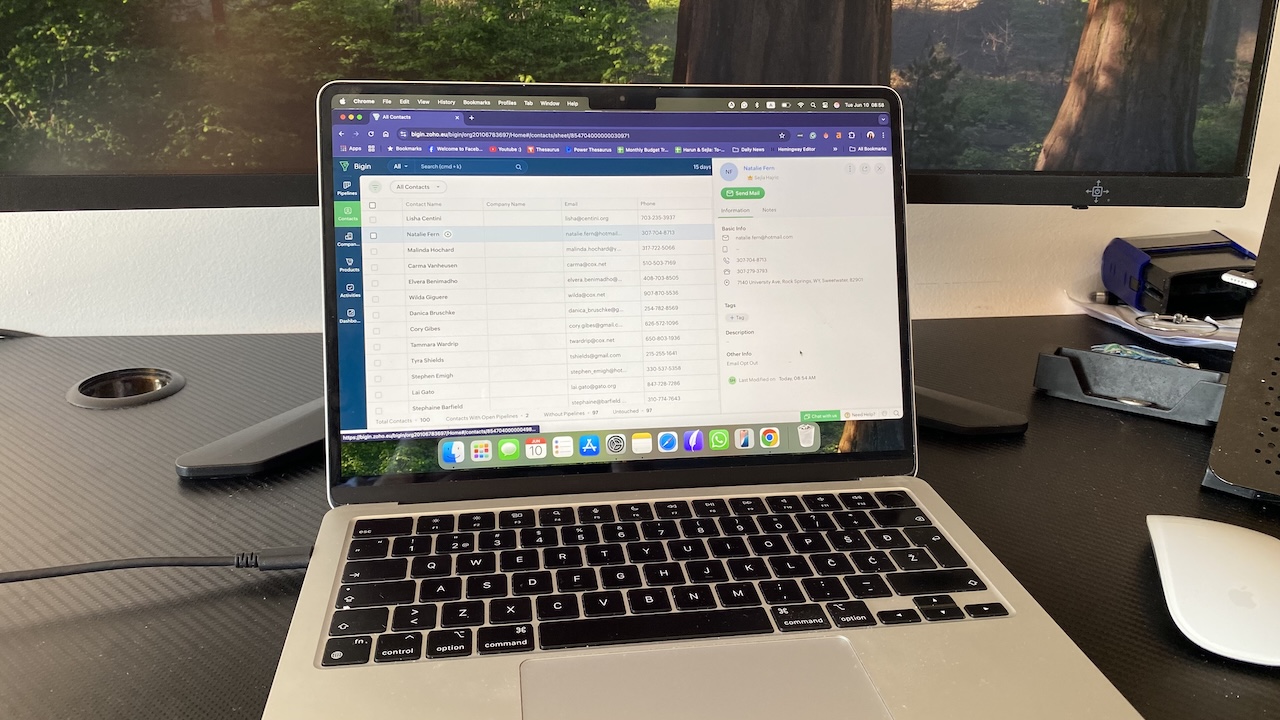
Pros
- Built specifically for small teams
- Easy to set up, even if you’ve never used a CRM
- Clean pipeline view with drag-and-drop stages
- Affordable pricing
- Mobile-friendly
Cons
- Limited integrations compared to Zoho CRM
- Not ideal for large databases
Bigin feels like someone finally designed a CRM for regular people. I was up and running in under 15 minutes—no clutter, just a clean setup wizard and clear options.
The contact views are simple but effective: filters, tags, and a timeline that shows emails, calls, and notes in one place. For email and calendar sync, it plays well with Gmail and Outlook, and there’s native mobile support, too.
While integrations are limited compared to bigger platforms, they cover the basics most small teams need. Exporting contact data is straightforward, and Zoho is transparent about what it collects and stores.
If you’re a small business that wants something lightweight but functional, Bigin delivers.
Pricing
Free forever plan supports 1 user. Paid plans start at $7/user/month, billed annually.
Helpful next steps
- Read our Bigin review
- Try Bigin by Zoho for free
Visit site
Go to Zoho CRM Bigin’s official website
Best contact management software for contact scoring
Freshsales
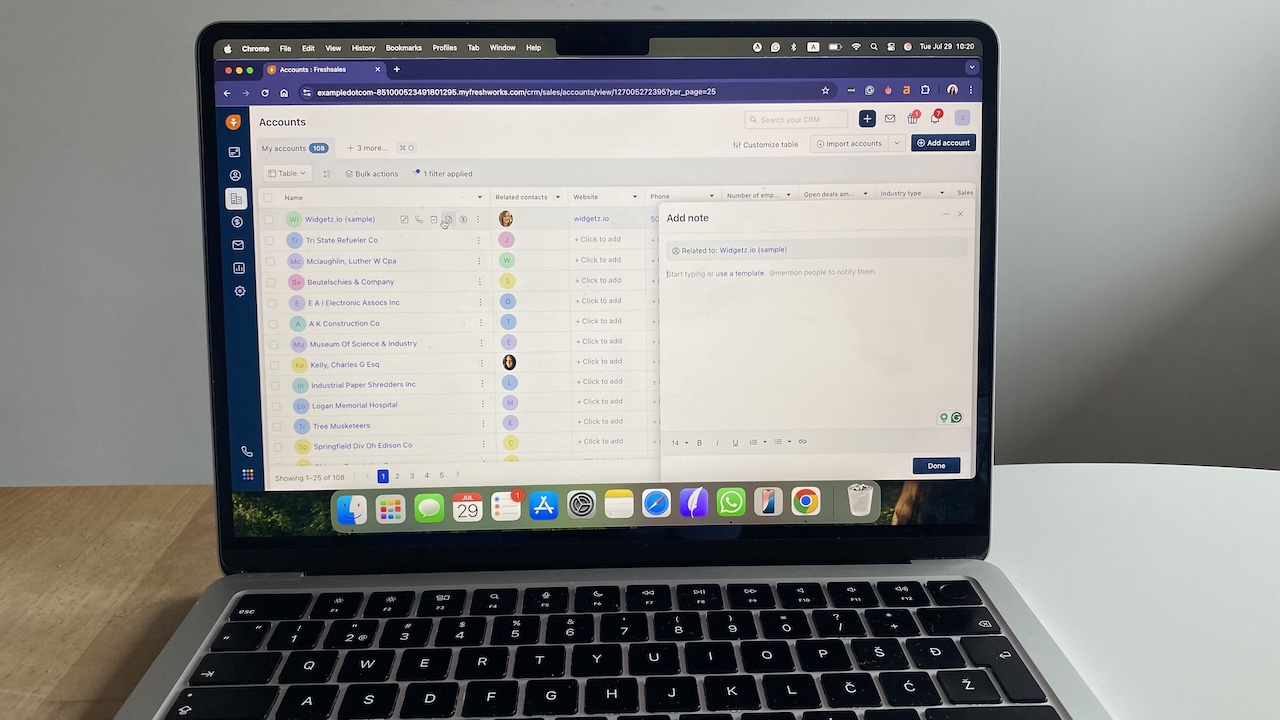
Pros
- Smart contact scoring and prioritization
- Built-in email, phone, and calendar tools
- Auto-logging of activities with minimal setup
- AI assistant offers nudges based on activity
Cons
- Bit overwhelming if you need basic contact management
- Automation setup takes time
Freshsales feels like it was made for teams that don’t want to guess who to call next or bother too much with admin. During testing, it automatically logged every email and call, so I didn’t have to copy-paste notes after a conversation.
The contact timeline gives a clean view of all activity in one place, and I could quickly filter and tag contacts to create targeted views—super handy for keeping warm leads from going cold. You can export all contact data anytime, and the settings give you clear control over what’s synced and stored.
Setup was quicker than expected: I synced my Gmail in minutes, and Freshsales pulled in my calendar, emails, and contact info without fuss. The Smart Views helped segment leads by stage or score, and the built-in AI nudged me when someone opened an email or went quiet.
If you’re serious about prioritizing leads, and want your inbox and CRM working together instead of side by side, Freshsales gets a lot right.
Pricing
Free for up to 3 users. Paid plans start at $9/user/month, billed annually.
Helpful next steps
- Read our Freshsales review
- Try Freshsales for free
Visit site
Go to Freshsales’ official website
Best contact management software for visual workflows and custom pipelines
Monday CRM
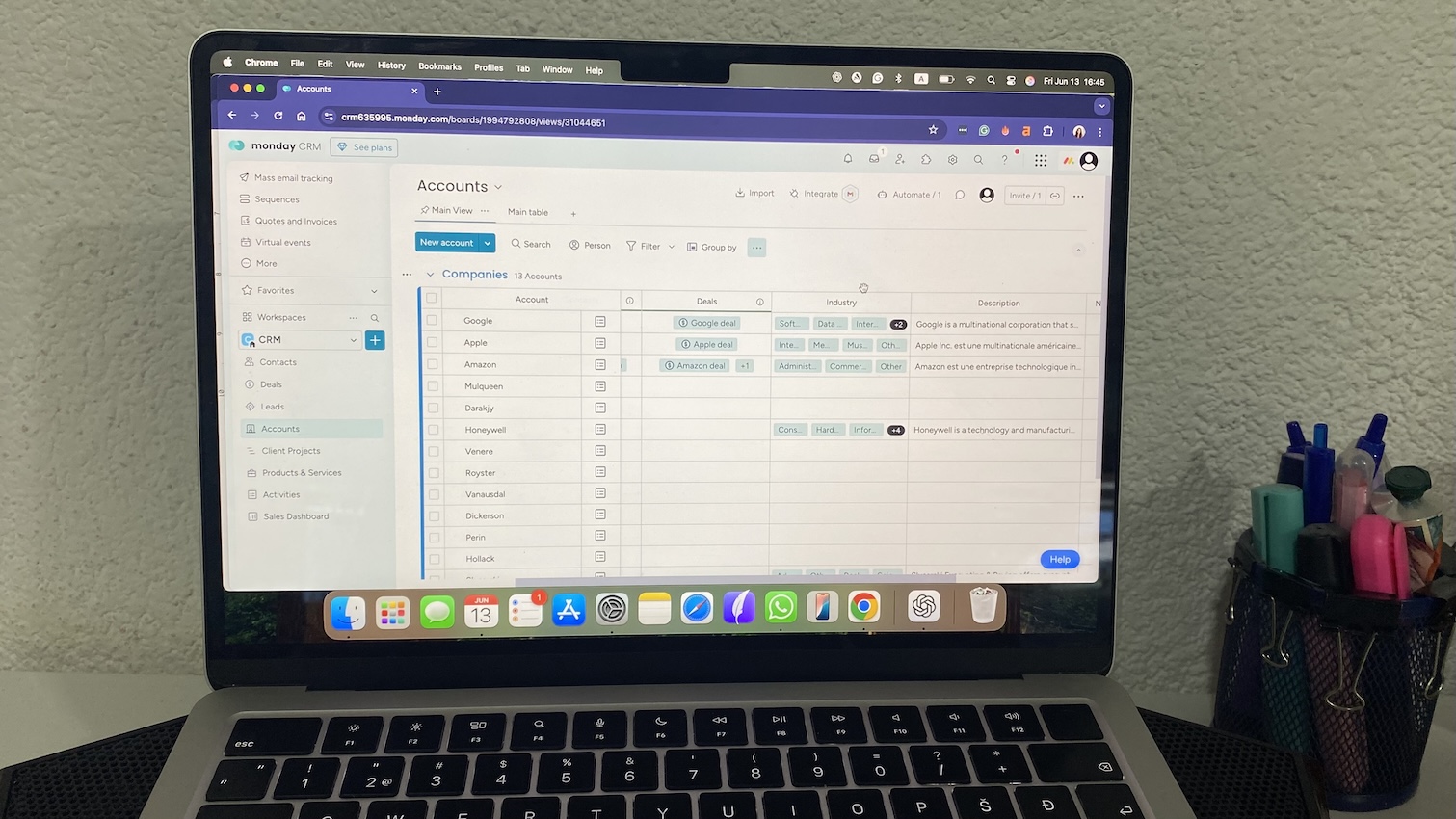
Pros
- Extremely flexible contact views and automations
- Great for building visual workflows and pipelines
- Easy onboarding with helpful templates
Cons
- CRM features are add-ons, more oriented to project management
- Can get expensive as your team or data grows
If you’re looking for a contact manager that bends to your workflow (not the other way around), Monday CRM delivers. I spun up a pipeline in under 10 minutes, dragging and dropping contact cards between deal stages like digital Post-its.
The default CRM template includes contact info, activity logs, and follow-up reminders—and you can tweak everything to match your exact process.
I liked that I could connect Gmail to track emails, set up Slack pings for follow-ups, and color-code contacts based on deal stage or owner. You’re not boxed into a traditional CRM layout. That’s a blessing if you’ve outgrown spreadsheets but still want that spreadsheet logic.
Activity tracking is mostly manual unless you build in automations or integrations. It worked fine for basic use, but power users might miss native timeline views or automatic logging beyond email. Still, for small teams who want to track deals and relationships visually,and tweak the layout as they grow, monday.com hits a sweet spot between structure and freedom.
You get up and running fast, especially with the CRM templates. Contacts are easy to filter, sort, and group with labels or custom fields. And exporting data? One click—no hidden hoops or vague policies.
Pricing
No free plan. Paid plans start at $12/user/month, billed annually.
Helpful next steps
- Read our Monday CRM review
- Try Monday CRM for free
Visit site
Go to Monday.com’s official website
Best contact management software for syncing across accounts
Contacts+
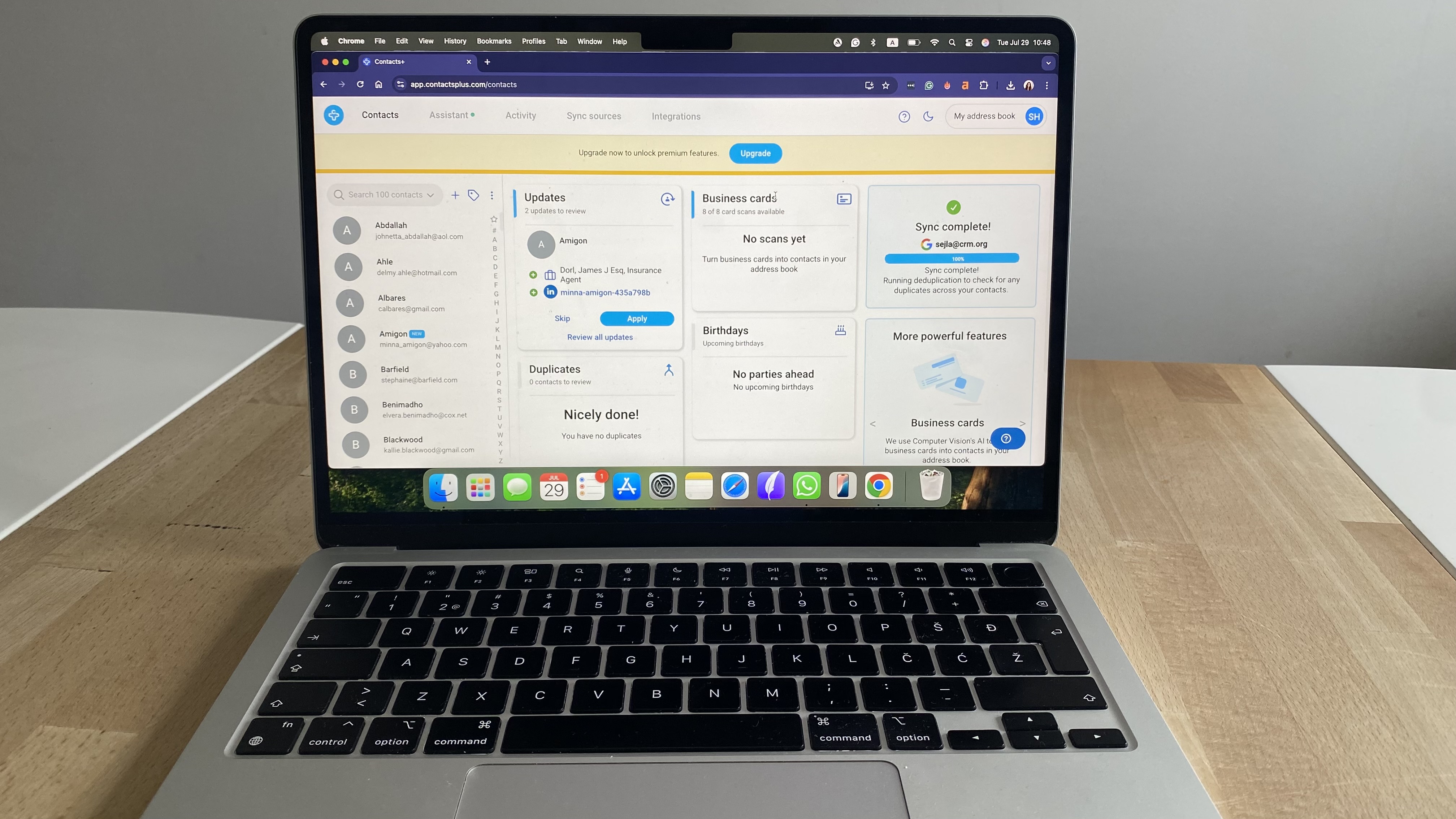
Pros
- Syncs contacts across Gmail, Outlook, iCloud, and more
- Merges duplicates and updates records automatically
- Mobile app is fast and easy to use
Cons
- Limited activity logging & customization
- No real CRM or pipeline tools
If your contacts are scattered across three inboxes, your phone, and a forgotten iCloud account, Contacts+ is your cleanup crew and one of the best personal CRMs out there.
I connected my Gmail and Outlook in a few clicks, and within minutes, it pulled everything into one clean list. Duplicates were merged, contact photos were added, and I finally stopped emailing the same person twice on different addresses.
This isn’t a CRM, and it doesn’t pretend to be one. There’s no automatic tracking for calls or meetings. But as a pure contact manager, it’s surprisingly polished. You can tag and favorite contacts, filter by source, and back up or export everything with ease.
Contacts+ is ideal if you need to sync, unify, and de-duplicate contacts across personal and work accounts without micromanaging the process.
Pricing
Free forever plan available for basic syncing. Premium plans start at $9.99/month, billed annually.
Helpful next steps
- Try Contacts+ for free
Visit site
Go to Contacts+’ official website
Best contact management software for Gmail users
Copper
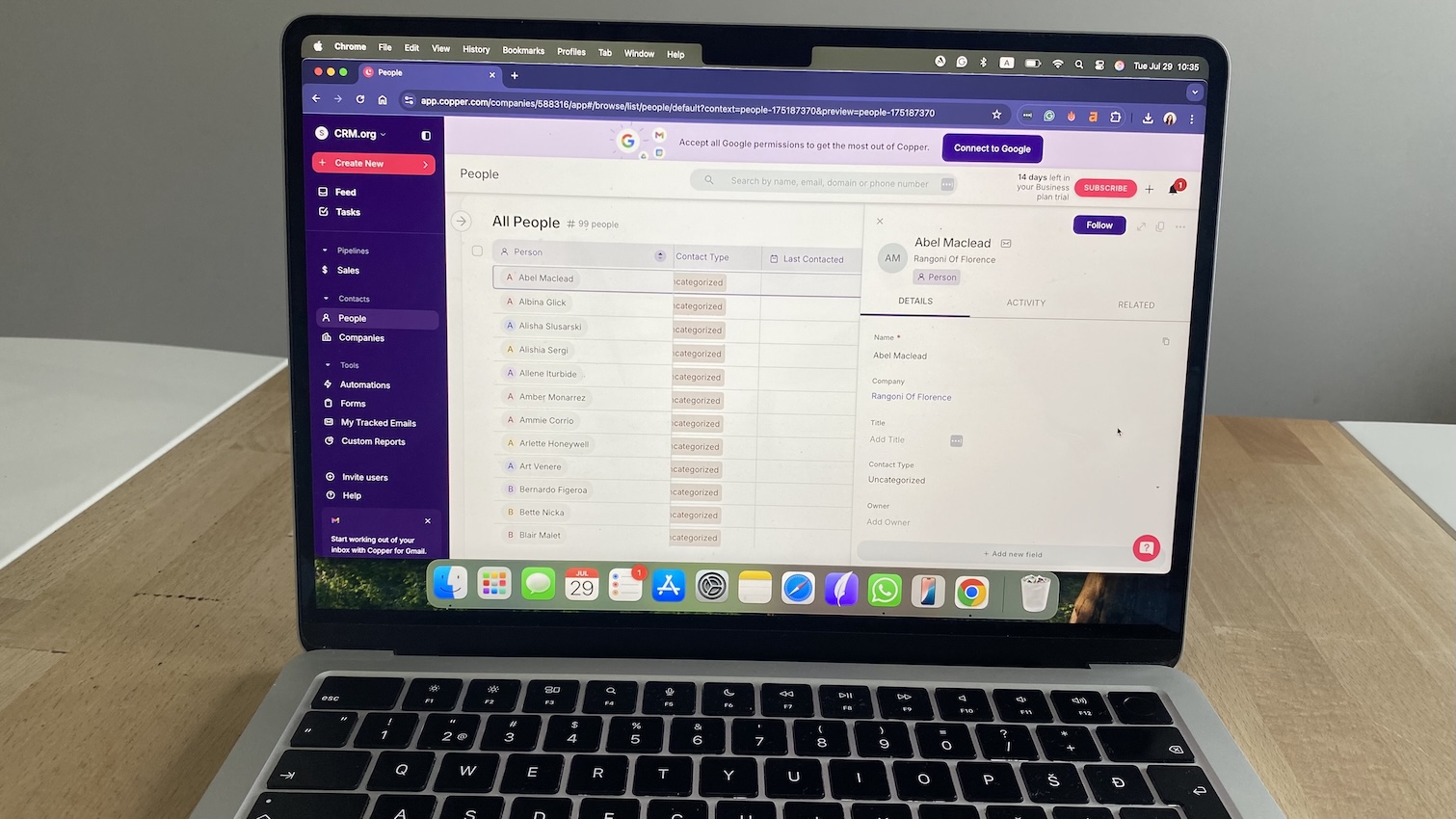
Pros
- Built directly into Gmail
- Automatically logs emails and meetings
- Clean, modern interface
- Google Calendar + Drive integration
Cons
- Only really works for Google users
- No free plan
Copper is a CRM that lives inside your Gmail. Every contact, task, and deal is in a panel right next to your inbox. It logs emails automatically, links meeting notes, and lets you tag or segment contacts without leaving your email thread.
Setup took less than 10 minutes. Once connected, Copper pulled in recent email threads, meetings, and tasks tied to each contact. The software subtly offers suggestions based on context, like creating a new opportunity or assigning a follow-up.
Views are flexible, and exporting data was simple and transparent. You can also pull in external tools through Zapier, but for Google Workspace users, most of what you need is built in.
If your team already lives in Gmail, Copper will feel like an add-on; not a whole new system to learn.
Pricing
Paid plans start at $9/user/month, billed annually.
Helpful next steps
- Read our Copper CRM review
- Try out Copper for free
Visit site
Go to Copper’s official website
Best contact management software for social-savvy teams
Nimble
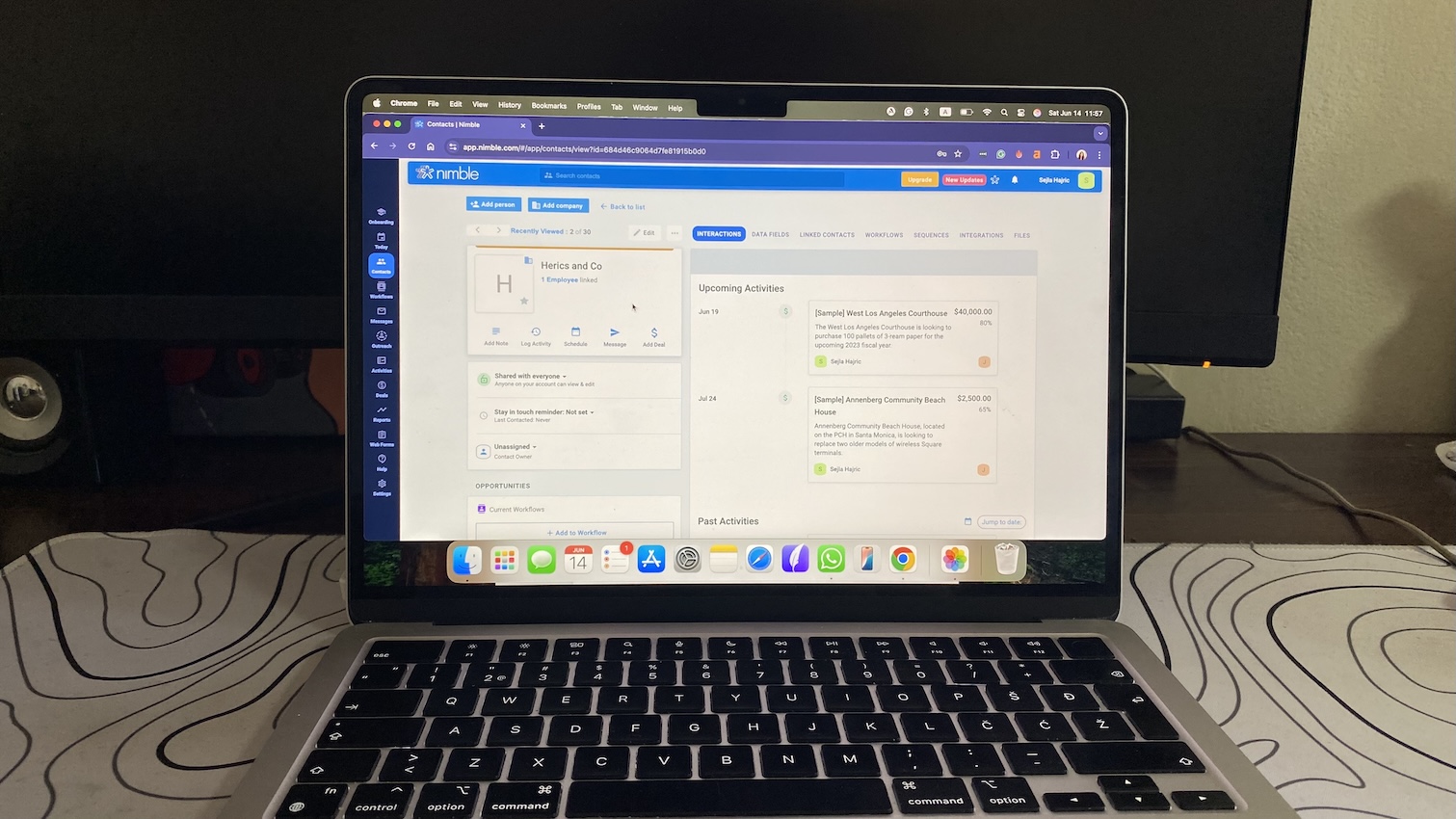
Pros
- Pulls contact data from social media
- Auto-enriches contacts with social and company data
- Unified inbox for email, social, and tasks
- Smart suggestions for follow-ups
- Chrome extension works on LinkedIn, Gmail, and more
Cons
- Social syncing can be hit-or-miss depending on profile visibility
- Basic marketing automation via email sequences and group messaging
Nimble is the tool I will always reach for when I want contact management to feel more like networking and less like admin work. I connected Gmail and LinkedIn, and Nimble instantly built rich profiles for each contact, complete with company bios, social handles, and even recent tweets.
Nimble browser extension is the real star. I could hover over a LinkedIn connection or email signature and instantly tag the person, add notes, or schedule a follow-up, without leaving the page. The Smart Contacts panel pulls in everything: email history, calendar events, call notes, and even social messages when available.
Contact organization felt thoughtful. I used tags, custom fields, and filters to create dynamic lists based on role, company size, or deal stage. Exporting contacts was quick and transparent, and Nimble makes it clear you own your data.
Pricing
Paid plans start at $24.90/user/month, billed annually.
Helpful next steps
- Read our Nimble review
- Try out Nimble for free
Visit site
Go to Nimble’s official website
Best contact management software for sales teams
Pipedrive
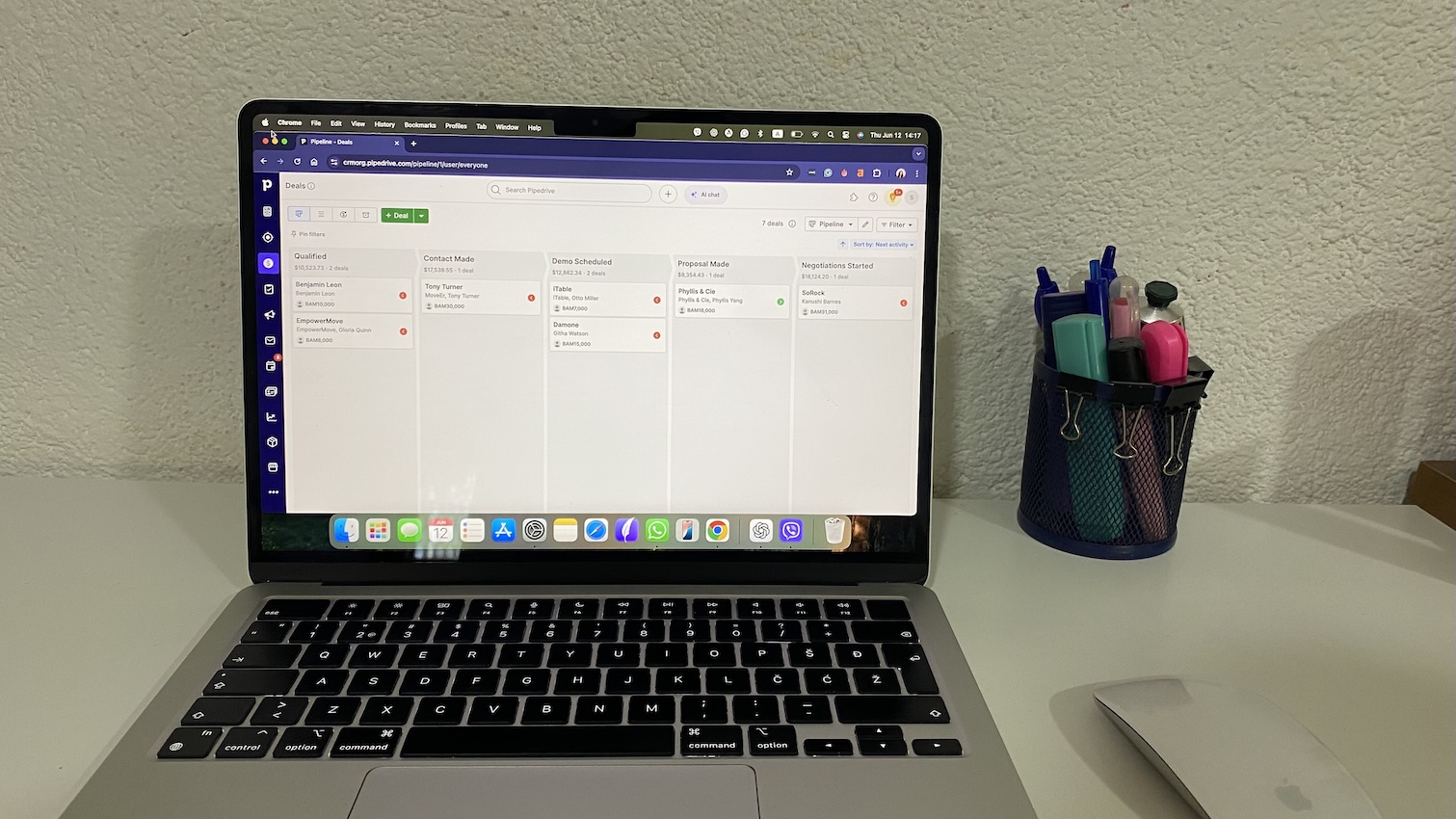
Pros
- Visual pipelines make tracking deals intuitive
- Contact records tie activities, emails, and notes together
- Custom fields and filters for segmenting contacts
Cons
- No free plan
- Reporting tools are limited on lower-tier plans
If you live and breathe sales, Pipedrive meets you where you are. It’s built around pipeline stages, but its contact management tools are far from an afterthought. It’s fast, frictionless, and the UI stays out of your way.
When I tested it, I appreciated how every lead or contact came with a full timeline—emails, calls, notes, and scheduled activities were all in one scrollable view. There’s no need to dig around different tabs just to see your last touchpoint.
Setup took under 20 minutes. I imported contacts, set up custom fields for buyer personas, and used tags to group them by deal stage or industry. Filters let me quickly slice the list to, say, only show “warm leads from Q2.”
Pipedrive also tracks email opens and link clicks (if you sync your Gmail or Outlook account), and logs activities automatically once you schedule them. It doesn’t offer full workflow automation unless you move up a tier, but it gets the basics right.
Data export is straightforward, and ownership terms are clearly stated: your data is your own. As for integrations, you’ll find plenty, especially with calendar and email tools.
Pricing
No free plan. Paid plans start at $14/user/month.
Helpful next steps
- Read our full Pipedrive review
- Try Pipedrive for free
Visit site
Go to Pipedrive's official website
Best contact management software for solo users
Less Annoying CRM
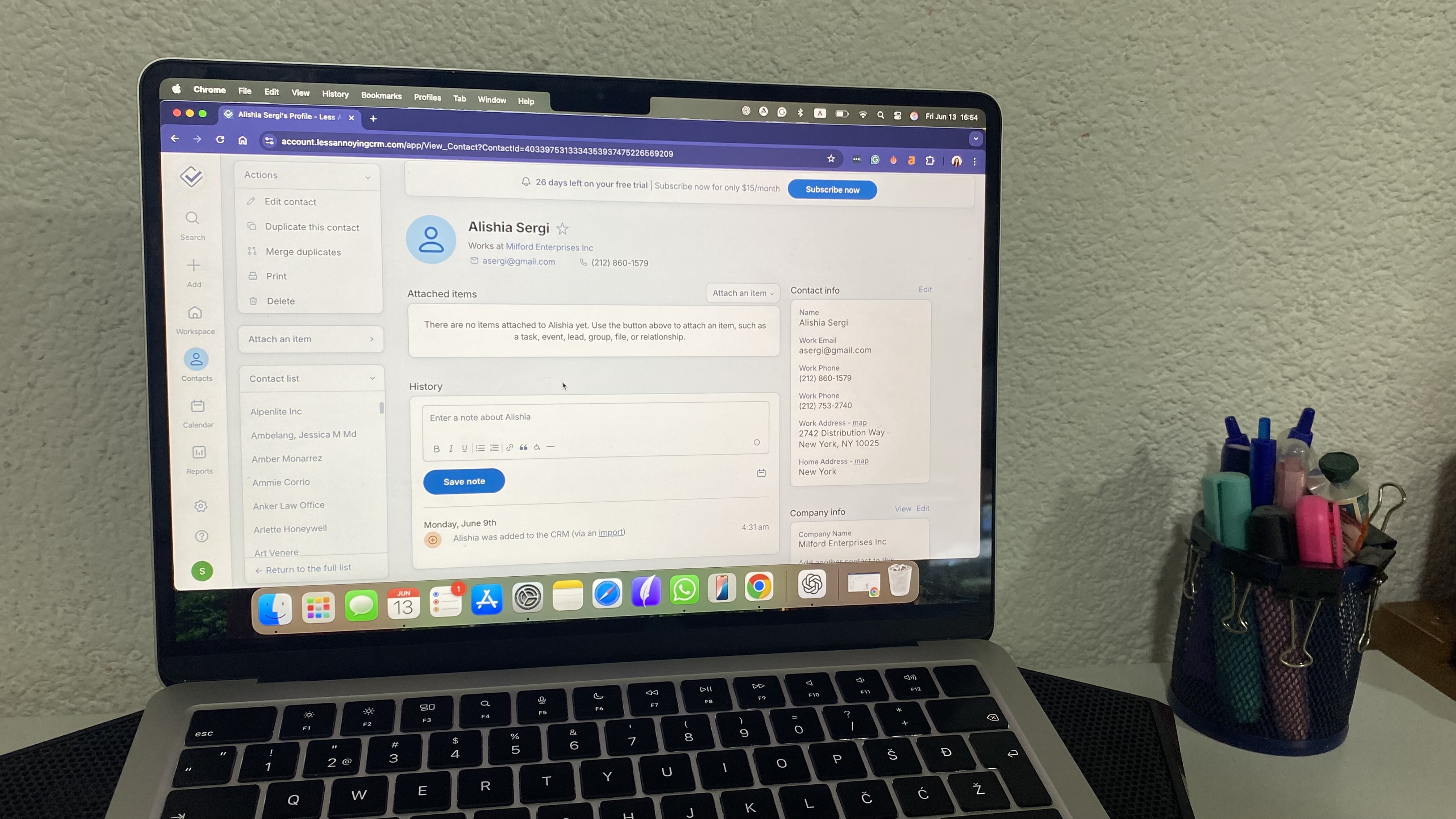
Pros
- Clean interface with no distractions
- Quick to learn, even for non-tech folks
- Transparent pricing with no upsells
Cons
- No mobile app
- Limited integrations compared to bigger CRMs
Less Annoying CRM lives up to its name—it’s refreshingly simple. I had my contacts imported, pipeline set up, and follow-ups scheduled in under 20 minutes.
You won’t get deep automation here, but you will get clarity. I appreciated how contacts, companies, and tasks all live in one central view. It’s easy to search and filter by tags or custom fields, and the calendar view gently nudges you to stay on top of follow-ups. Activity tracking (calls, notes, meetings) is manual, but straightforward; like updating a shared doc.
Integrations are minimal (no native Gmail or Outlook sync), but that’s by design. It doesn’t try to be everything. And the data export process? One of the cleanest I’ve seen. You always know where your info lives and how to take it with you.
Pricing
Flat-fee pricing, $15/user/month.
Helpful next steps
- Read our Less Annoying CRM review
- Try LACRM for free
Visit site
Go to Less Annoying CRM’s official website
Here’s how to pick the right tool
If your main problem is messy contact lists, scattered info, or forgetting who to follow up with, start with a contact manager like Airtable or Contacts+. They’re simple, flexible, and won’t overwhelm you.
If your work involves tracking deals, assigning tasks, or collaborating with teammates, go with a proper CRM like HubSpot or Freshsales. You’ll get structure, reminders, and better visibility across your workflow.
Not sure where you land? Look at how you work today:
- If you mostly use email and spreadsheets, start small.
- If you’ve got leads, pipelines, and “who owns this?” moments, start with a CRM.
You don’t need to get it perfect right away. Most tools are free to try. Pick one, test it with real contacts, and see if it reduces friction or adds it.
Still exploring? Check out our guides to:
FAQs
Do I need contact management software or a full CRM?
If you just want to organize names, emails, and notes, a contact manager is enough. If you’re tracking deals, tasks, or sales pipelines, go with a CRM.
Can I use contact management software with Gmail or Outlook?
Yes. Many tools like HubSpot, Copper, and Bigin offer direct integrations. Others (like Airtable) may require third-party tools like Zapier.
What’s the easiest tool to start with if I’m not tech-savvy?
Bigin and Airtable are both beginner-friendly. They offer quick setup, clear interfaces, and minimal clutter.




